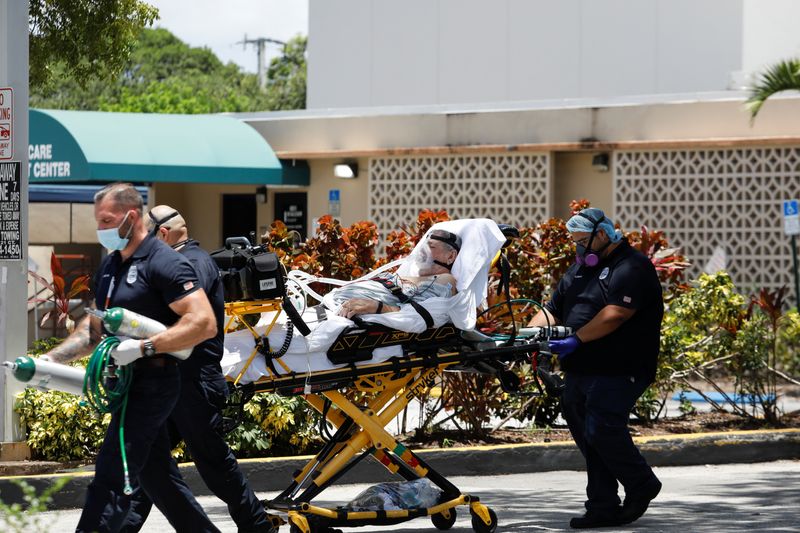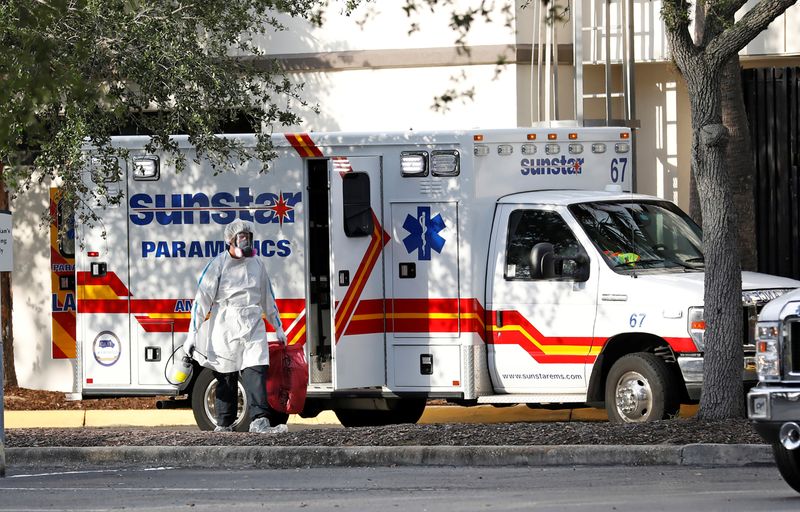By Lisa Shumaker and Rich McKay
(Reuters) - Deaths from COVID-19 surpassed 150,000 in the United States on Wednesday, more than any other country and nearly a quarter of the world's total, according to a Reuters tally, delivering fresh blows to the U.S. economy
The increase of 10,000 COVID-19 deaths over the last 11 days is the fastest in the United States since early June, prompting heated debates between the American public and its leaders over the best course forward.(https://tmsnrt.rs/2P87LUu)
Commercial pilot Rob Koreman of Fort Lauderdale, Florida, said he had been stunned by the climbing numbers.
"I'm a pilot and hit so many cities, so many people on board, I have to be aware," said Koreman, 50. "Basically, none of this should have happened. We needed state coordination, if not flat-out a federal mandate."
Florida reported another record in one-day deaths on Wednesday, 217, according to state health officials.
Among the 20 countries with the biggest outbreaks, the United States ranks sixth in deaths per capita, at 4.5 fatalities per 10,000 people.
Only the United Kingdom, Spain, Italy, Peru and Chile have a higher per capita rate, the tally shows, with U.S. deaths making up nearly 23% of the known global total of just over 661,000.
The pace of infections has accelerated since the U.S. death toll passed 100,000 on May 27. The epicenter has also moved, to the South and West from the area around New York, which still has by far the highest number of fatalities of any U.S. state at more than 32,000.
Arkansas, California, Florida, Montana, Oregon and Texas each reported record spikes in fatalities on Tuesday.
The rising numbers have crushed early hopes the country was past the worst of an economic crisis brought on by stay-at-home orders and business closures that have devastated the economy and thrown millions of Americans out of work.
FED WARNS OF ECONOMIC DAMAGE
"We have seen some signs in recent weeks that the increase in virus cases and the renewed measures to control it are starting to weigh on economic activity," Fed Chair Jerome Powell said in a news conference following release of the U.S. central bank's latest policy statement.
Many health experts say the U.S. outbreak could be brought under greater control if guidelines to maintain social distancing and wear masks in public were enforced nationwide.
U.S. President Donald Trump has rejected the idea of a federal mask order and was initially reluctant to be seen wearing one. Trump has since come around to supporting masks but has still not imposed a national mandate requiring them.
Louie Gohmert, a Republican lawmaker from Texas who has at times refused to wear a mask, tested positive for COVID-19 on Wednesday, raising concerns that other members of Congress may also have been exposed.
Officials in New Jersey, the state with the second highest death toll, again pleaded with young people to avoid large gatherings.
"Coronavirus is more easily transmitted indoors. Crowded indoor house parties are not smart or safe," Governor Phil Murphy wrote on Twitter.
With the scheduled reopening of schools days away in some states, the Trump administration has pushed for students to return to classrooms, while teacher unions and local officials have called for learning to remain online.
The University of Washington's Institute for Health Metrics and Evaluation (IHME), whose forecasts are closely watched by policymakers including the White House, predicted in March that the pandemic could kill more than 81,000 people by July.

In its latest statement on July 14, the IHME said its model now projects the U.S. death toll at more than 224,000 by Nov. 1, although the institute added that many fatalities could be avoided by preventative measures such as masks and social distancing.
